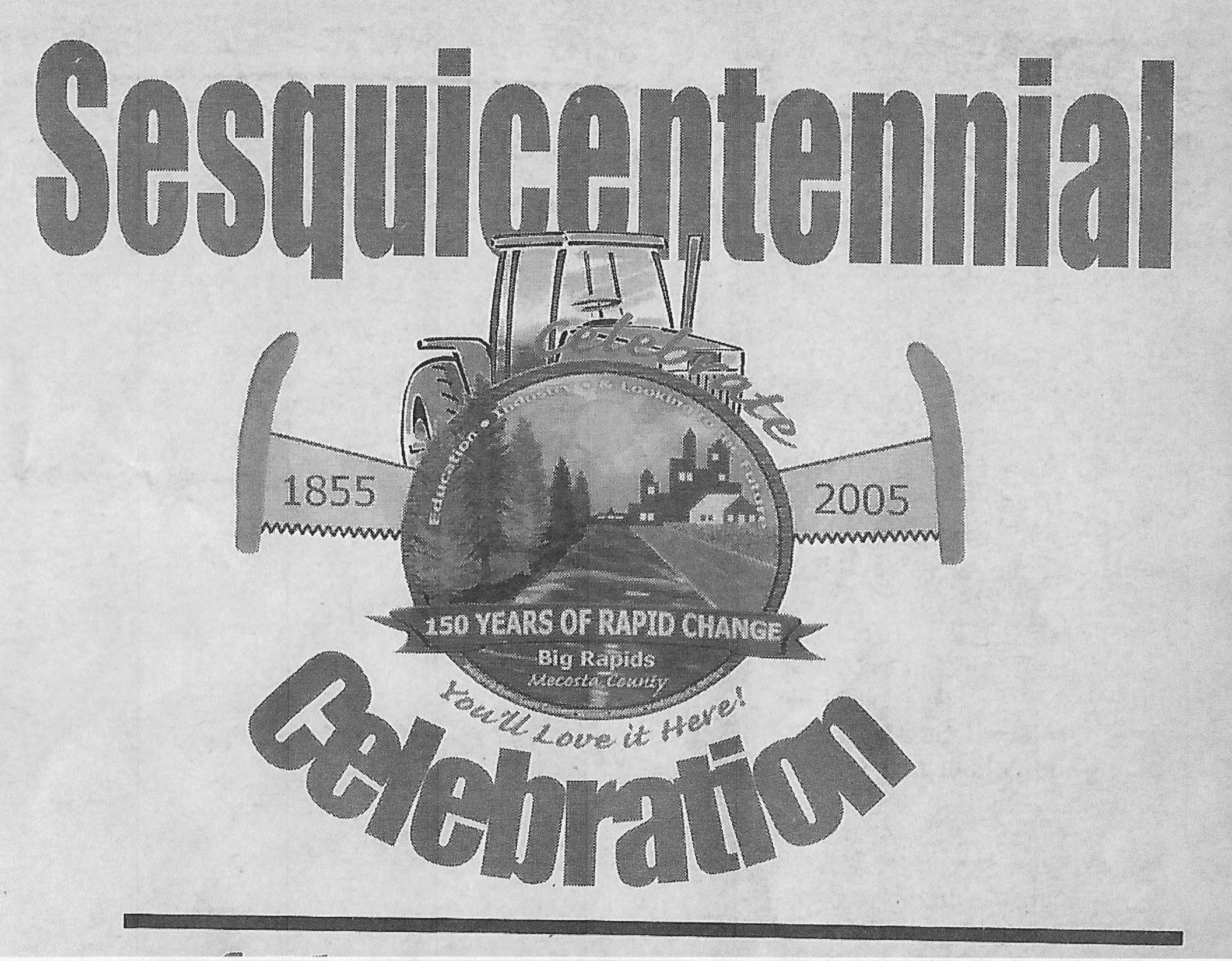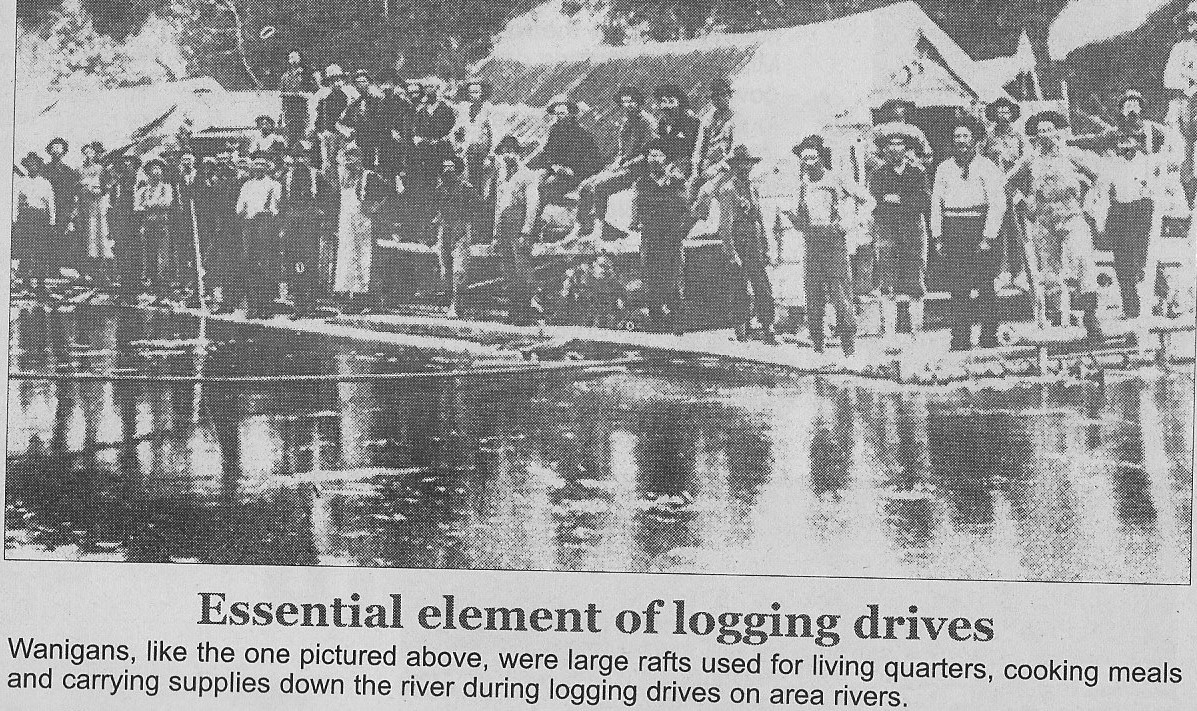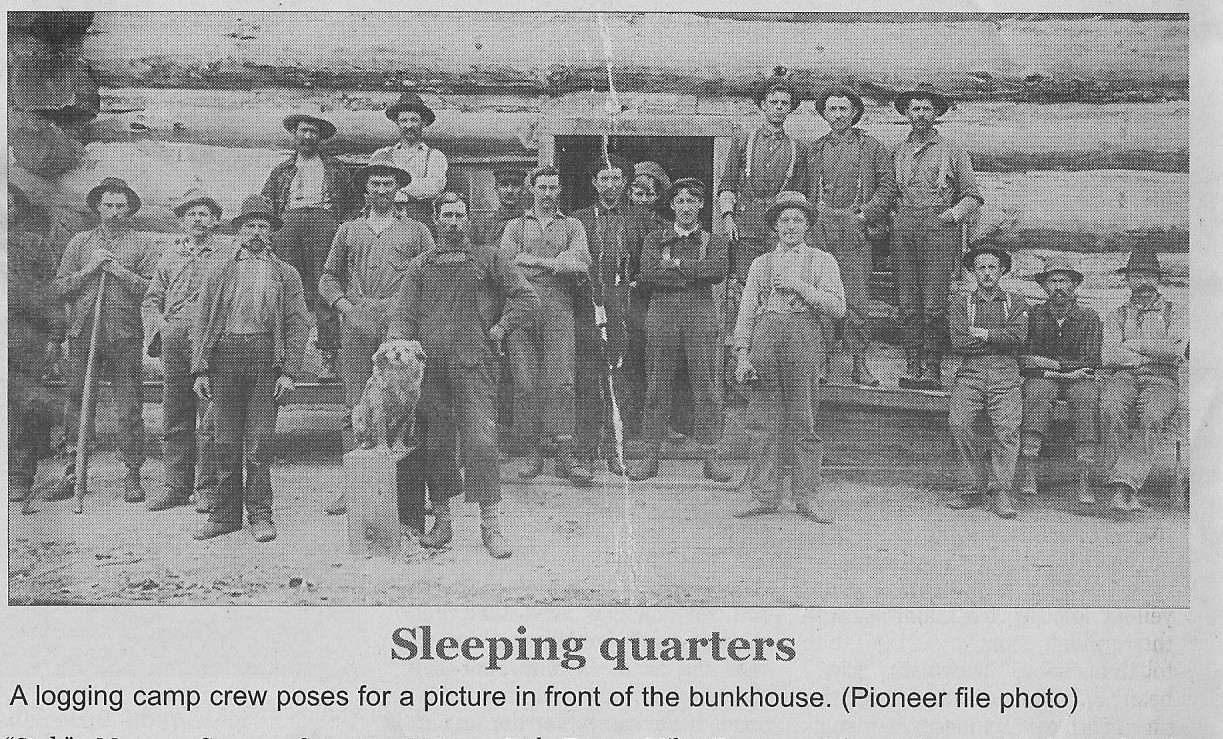
Part V - Government, a supplement to the Big Rapids Pioneer Newspaper. Used with permission.
PINE STUMPS ONLY HEADSTONES OF MEN WHO HARVESTED FORESTS

Editors Note: The following article is reprinted from the centennial edition of the Pioneer in 1955
Have you ever wondered how many logs were floated down the Muskegon River? How many men were employed on the "drive," how many years the drive came down the river and who some of the men who composed the drives were?
A.W. Miles, local postmaster and politician, good friend to everyone, has gone to no end of trouble to tell Pioneer readers something iof those days, from his own experience and what he has gleaned from friends who could give him these facts and data. You will enjoy reading of the men who have helped make History.
By A.W. Miles
I saw them with their red, blue, yellow, and plaid mackinaws, with their broad rimmed hats ... their tobacco sacks around their nacks. I heard their shouts as they rolled the pine logs into the streams. The clank of the hooks in the claps of their peevies, these Rivermen, and what men they were! Fine looking with every muscle in their bodies developed hard as iron, and true as steel.
But who writes about them now? They are gone and so is the timber. These pioneers have passed ... you will never see them again. There are no more like them. Occasionally some writer tells about some lumberman who made his millions out of white pine but merely to mention the Money.
I never look at a pine stump that I do not wonder who cut the tree and wonder if I know the man. These stumps are the only headstones for the men who pioneered this country and have passed on.
A few are living ... a very few, and I am writing this article hoping that some one more ably than I will write about them. And what true stories writers could tell of the old Muskegon Valley ... of the Muskegon River and those men! There was poverty, tragedy and comedy. These men experienced it all; they worked in the woods in winter and drove the logs down the River in Summer; they worked from sunrise to sunset with all their might, every muscle strained to capacity and hard as rocks.
And ready all the time. Ready for what? upi ask. Well, just anything that came along. For fun if you wanted it or fight if you were looking for it. And what fights they had! They were rough men but not tough men and there wasn't a killer among them.
What a sight it was to see the drive come down in the spring. Four rafts, or floats, as they called them, with 100 men or more. There was the drive boss, the two side bosses, the jam boss, the boon boss, when they carried one. Then there was the cook, cookee and blacksmith. Each had his own work to do and knew it.
And were these men particular? Well, I'll say they were. The hook on the peevy had to hang just so. The stock had to be the right size and weight. Their boots had to be glove tight. And they were as graceful as swallows when riding a log using nothing but their peevy to guide them, calks in their boots to stick to the log with.
How did they handle those young men, full of life, and ready for anything? Well, I'll tell how they did it. They rules on the River and these men knew the rules.
Here they are, as Amdy says, in a couple of nut shells, no fighting on the River, no drinking on the River, and at nine o'clock at night, bang!, the lights went out and you went to bed. And these rules every man lived up to it if he wanted to stay. If two of the best men the boss had quarreled, they had to go, and that didn't mean maybe. They had to go. Because if the boss was a small man and a man or men who were discharged started anything, there were always plenty of men to back the boss. They knew that discipline had to be lived up to or they could not run the work.
Maybe you think that because they were called "lumberjacks" and "river-hogs" they were different from other men. No different at all, only in dress. They had hearts in them as big as a B. and O. box car; they were as tender-hearted as a child when touched by the misfortune of one of the crew. Or anyone else for that matter.
If one of them was sick or injured, or dead, they would carry him as tenderly and gently as they would have carried a child. Many a dollar they gave away to those less fortunate than they, and what a fine way they had of doing it! If one of theur old working chums came on the River on crutches, or a broken arm, or sick, they would string in one at a time, to the bookkeeper and say, Give this man a day's work for me. And then after 50 or more men had done this the bookkeeper gave the sick man a time order or check for the amount. And remember this, reader, they only received from one dollar and a half for working from sunrise to sunset.
They were rough men, yes, and as a rule were not educated men as we term education, But no night was so dark and no road so long they wouldn't go for a person in need.
They are gone ... gone when men must go. But won't some of the few who are left write something about all this? Write the story of their youths, the River and its enchantments, write of the trials and the triumphs of those old River days.
No purfume ever made can compare to the smell of the pine, tall and straight, the long needles on graceful branches, rocked by the winds, until the woodsman's ax laid it low, sawed it into logs, placed on skids, drawn to the river, down the river to the mills where it was made into lumber. And then it was shipped to help build big cities. Who cared how, or where it came from? Nobody. We care now but the big timber is gone and so are the men who cut it.
I saw the last drive go down the river. Jim Ellis took it down. Jim Ellis, the man who probably piloted more logs down the Muskegon than any other man. The drive was at the Reunion grounds on Decoration Day. Simon Credy of Evart was one side boss aaand Rock Dan, the other, both aoldtimers and I think still alive.
Jim Ellis was bound I should eat supper with him so I had supper on the last drive that went down the river.
The drive was a small one the crew not as large as in former years. Oldtimers told me that no jam ever got away from Jim Ellis.
And sometimes jams were hard to hold. At other times they were hard to break. Log driving was a trade, or an art, just as anything else. You had to know how to do certain things and when.
I could relate some exciting things the men have told me but I am leaving if for the others to tell, magazine writers and newspaper men write of the old West, of the cowboys and frontiers men and bad men of that time.
But why don't someone write of our shanty boys, river drivers, and good men? Men who made as much history as the men in the West.
Forty years ago the coming of the drive was an event long heralded. Many residents of the present time can remember the congenial cook, Jud Marble. It is said he worked for days ahead to have cooked enough to treat the visitors who came on board to view his spotless kirchen.
Then those other famous chefs of the river, Art Harrison, Henry Billenger, Joe DuChine, Frank LaVign and the three Gordon Boys, and Johnny Gleason were all famous in their day.
In the far away days these men ate side pork, corned beef hash, bread, cookies, fried cakes, prunes, dried apples, pickles, soup, beans, potatoes with no coffee, no milk, sugar or butter. But in later years the food was better and many things added to their diet which had been denied them before.
Eleven hundred million feet of logs was the largest drive in any year and the number of feet averaged 400 million for about ten years. For 30 years the Muskegon Boom Company drove the logs and after that came the Log Owners Boom Co.
These are names which still cling to well known places on the Muskegon and there are many of which you, perhaps never heard. Among the names given localities on the river by the rivermen were Hell's Kitchen, Scotch Maggie's Flats, Snow Town, Sheep's Ears, Ox Bow, Fiddler's Elbow and Norwegian Rollways. Some of the streams that floated logs into the Muskegon River were Dead Stream, Bear Creek, Wolf Creek, Butterfield, Clan River, Hersey Branch, Little River and Brooks Creek.
Would you be interested in knowing the names of some of these men? I counted most of them as my friends and I hope those who are left are still my friends, for no man has too many. Maybe you can add to this list.
Rocky Dan Van Wormer, Al Hank, Charlie and Ed Rocken, Bob and Dick Lypps, Pony, Hand and Joe Belonger, Chicago Jack, Black Louis, Buckshot, the Indian, the Webb Boys, McClelland Boys; Kenneth McDougal, Sam Sage; "Stub" Moore; George Covert; Charles Gingrich; Dan Morrison; Simon Crev; Bill Sloan; Tom Edwards; George Stugeion; Mike Edwards; George Free; Al Lewis; Ira Hoit; Bill McGuire; Hugh McGuire; George Bader; Harry Free; Walter Free; Bill Radaal, Curly McKill; Jack McKill; Barney Johnson; Gene Compton; Kouie Compton; Asal Jones; Joe Galtery; Fred Wright; Billy Roy; the Larkins Bys; the Davis Boys; Denny Aldrich; Ira Mitchell; Hod Mitchell; Tony Edgecombe; Les Wadsworth; Lee Jones; Link Jones; Dick Collins; Dan Collins; John Peepers; Jack Taylor; Ed Webster; Bill Haggerty; George Mayo; J. Mayo; Ab Mayo; Pola Bushaw; Pearl Green; Tom Handricks; Tom Harcourt; Andy Cunningham; Frank Price; High McKeg; Jack Tracy; Mike Tracy; George Phillips, Paddy and Mike Whalen; Jim Ellis; Alex Bell; Tom Sturtevant; John Coe; Art Harrison; Paddy Hughes; Bill Collins; Lyle McCamley; Billy McCamley; Tom Hughes; Jack Fitzgerald; Jud Marble; Johnnie Gleason; Walt Harrison; Hi Fribley; John Hagadone; George Cole; Jim Horrigan; Will Foster; Fred Wakefield; Tom and Phil Sheridan; Thane Dougherty; Pat Murphy; Make Hayes; the Stilson Biys; Al Bolton; Riley LaVasar; Paddy O'Melia; Jeff Davis; Pat Deming; Ervin Anger; Will Anger; T. Milholland; Johnny Ward; Roy Gorman; Dan and Billy Russell; Jack O'Brien; Fred Brack; Johnnie Borey; Jack Mertens; Jimmy Haley; Charlei Harmon; Charlie Boyd; Thiompson Biyd; Ruben Gleason; Seth Witheral; George Douglas; Frank Hubbell; Jeff Hubell; Tote Comstock; Frank Young; Charles Smith; Frank Robinson; Fred Robinson; Billy Foyler; Angus Byer; Mike Hugh Biyer; Dave Fitzgerald; John Groves; Frank Allen; Hod Allen; George Truman; Frank McLaughlin; Fred Marble; Frank LaVigne; Will Raymond; Jack Battle; Dave Tuttle; Sam Reed; Clarence Evans; Mike Fleming; Grant Snyder; Fred Snyder; Andy Carpenter; Jim Riley; George Waite; Ben Whalen; Dough Botsford; George and Fred Rutherford.
You will recognize many if these men as prominent citizens in their later days, some farmers, some merchants, railroad men, and lumbermen and always good citizens.

Return to Mecosta sesquicentennial Page
Return to Home Page



